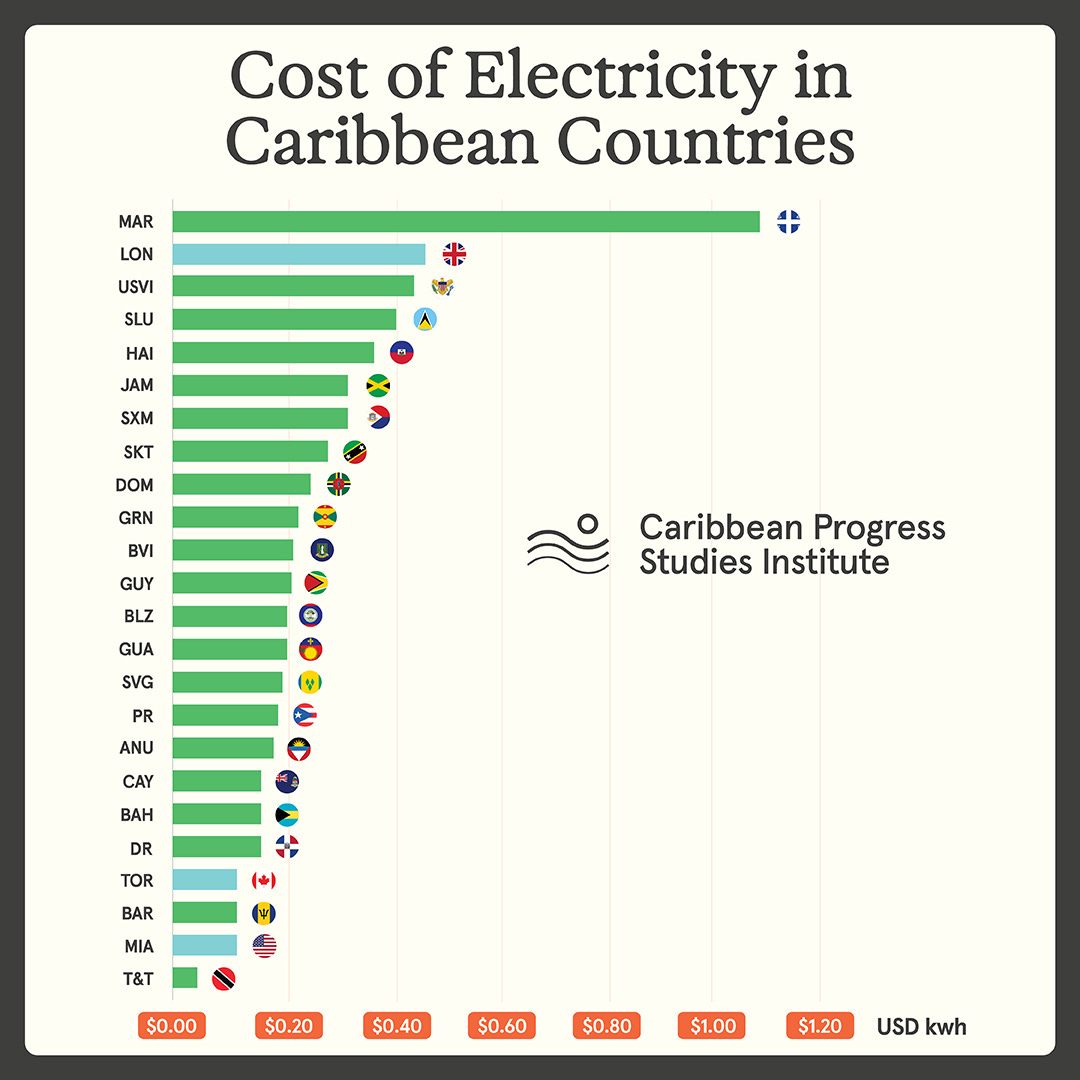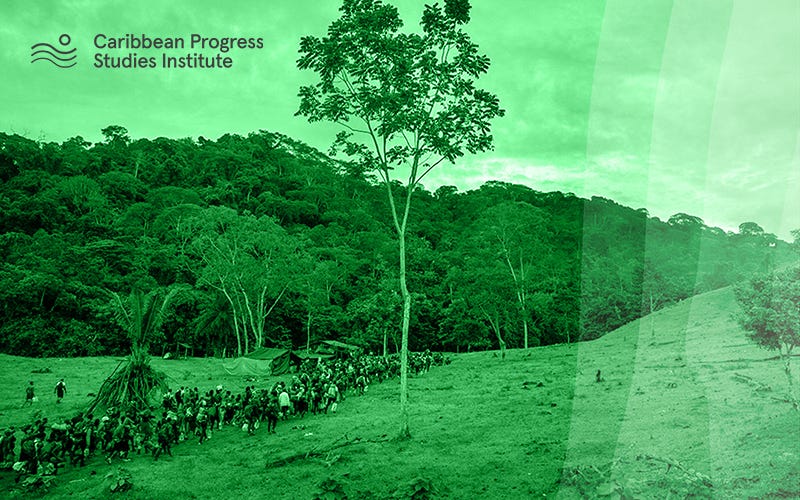Caribbean Currents #004
Power Struggles, More Haitian Unrest, and a Dengue Outbreak
October 6th, 2023 edition of Caribbean Currents 🌴🌊📊
In this issue
Lights Out!
A Bid for Order
Continental Crisis
Dengue Emergency
Podcast of the Week
Quick News
Lights Out!
Caribbean struggles with energy supply issues; weather drives excessive consumption
It was a tough month for several territories of the region as their electrical grids buckled under the pressure of increased energy use. High temperatures across the Caribbean have resulted in substantially higher climate control use, pushing inadequate and even antiquated power systems to their breaking point.
Barbados faced several blackouts culminating in an island-wide outage last month while Dominica also saw intermittent losses in service, forcing the incumbent supplier DOMLEC to seek intermediary third-party sources of power. Curiously, an official of the Barbados Light and Power Company (BL&P) blamed home photovoltaic (solar) systems for the difficulty in restoring service; systems that were inspected and approved by BL&P itself. Guyana, also facing shortages from its own infrastructural capacity, intends to start taxing high-use business customers during peak hours, to tamp down on some of the demand. Energy costs remain high throughout the region which is sensitive to global fuel price shocks.
This is all on the heels of price increases for electricity for several territories. Bermuda’s incumbent supplier Belco, announced price hikes this week to reflect global pricing, much to the displeasure of the opposition who called it “a punch in the gut”. Trinidad and Tobago’s government also announced utility hikes after a period of low prices.

Constant outages will threaten the region's economic stability, with most islands lacking the resources to update or overhaul their grids to face the looming pressures of climate change. Political impasses and the lack of an appetite for the course of action necessary to evade a looming power crisis, are leaving many territories of the Caribbean with woefully antiquated and inadequate infrastructure to meet their climate resilience goals.
This failure in policy prioritization and the corresponding decline in the reputation of the regional governments compounds an already troubling financial situation. Due to their aversion to prudent fiscal policy and sound internal audits, Caribbean governments lack the integrity required to get reasonable rates on international loans, supplement their stagnating external income, and rectify the infrastructural deficit.
The end result is a negative feedback loop that is plunging embattled commercial centers into darkness, shuttering schools early, and grinding life to a halt for hours at a time, in a region that simply cannot afford it.
A Bid for Order
UN Approves Kenya-led Task Force to Quell Unrest in Haiti
A non-UNSC peacekeeping force has been green-lit for Haiti. The Multinational Security Support (MSS) mission aims to restore order by supplementing and training the existing police force. Kenya, which initially proposed 1000 of its own officers, has been given the UN Security Council’s blessing (even though this is not a UNSC resolution) to lead the MSS.
"More than just a simple vote, this is in fact an expression of solidarity with a population in distress. It’s a glimmer of hope for the people who have been suffering for too long."
Jean Victor Généus, Haitian Foreign Affairs Minister
Haiti has become a major source of concern for leaders in the Americas, following a rapid descent into violence following the assassination of President Moise in 2021. The US has been reluctant to lead an intervention, with President Biden urging the UN to be the anchor for this initiative instead. The US has pledged $100M in aid.
Kenya has stepped forward to lead the MSS. Nairobi is no stranger to peacekeeping, often participating in such initiatives across the African continent, including in Somalia in 2007. Kenya is joined by Antigua, Belize, and Barbados (via the RSS) in providing support for this mission.
“Peacekeeping” missions like these neglect the old adage about teaching a man to fish. That is, they are but a temporary solution to a deeply historical problem that not even an endless infusion of troops will solve. The United States is acutely aware of this scenario having experienced the support sinkhole that was the 20-year war in Afghanistan. This is likely the prime reason for their reticence in leading any campaign in Haiti. Why risk a repeat, right on your doorstep?
The root of the problem is- you guessed it- institutional. Haiti lacks many cornerstone institutions necessary to stabilize a modern society. Nothing short of a herculean effort would be sufficient to erect building blocks such as functional healthcare, judicial systems, constabulary forces, social services, education system, and an agricultural sector. The logistics alone have prompted even the largest economy on Earth to take pause and allow someone else to throw their hat in the ring.
By cheering on Kenya to lead the charge, the USA has recused itself of any reasonable blame when this latest effort inevitably creeps past its intended expiration. Before long we’ll be back, voting on another resolution, against the same backdrop of this very failed initiative.
Continental Crisis
Migrants crossing Panama-Colombia border reach 400000
Refugees are crossing the Darien Gap into Panama from Colombia in record numbers. The deluge of people has prompted Panama to enact stronger short-term stay regulations, lowering the visa-free stay duration for some from 90 to 15 days. Panama has also deployed military forces to the border, citing increased criminal activity as a result of the influx of refugees. The government announced an increase in deportations to help cope.
A wave of immigration challenges is sweeping over the Americas and Mexico’s President Andres Obrador blames US sanctions. Obrador slammed US foreign and immigration policy, directly attributing them to the conditions forcing mass migration across the Americas. His comments came during high-level meetings in Washington between Mexican trade representatives and their US counterparts. US officials, however, maintained more trade-oriented talks, opting to skirt the issue at least in the public forum.
The US also deported dozens of Haitians to their home island, mere hours after advising its citizens to leave the embattled country promptly. The move prompted widespread backlash from human rights organizations globally, which cited the deteriorating conditions on the island as a threat to the well-being of the deportees.
The veritable collapse of Venezuela has been dubbed the “greatest immigration crisis the Americas has ever seen”. Over 2.5 million Venezuelans were residing in Colombia, at the end of 2022, a stark increase from the 400000 the year prior. Some make the longer journey through the Darien forest where they are ferried across Panama to become Costa Rica’s problem. The end of Title 42 pandemic asylum restrictions in the United States is partially responsible for this year’s dramatic increase, giving credence to President Obrador’s statements.
Each country capable of passing the buck does so until it reaches a country that can’t. This is when it becomes a crisis. Panama has unfortunately found itself outstripped by the sudden flood of new immigrants and cannot process them quickly enough to negate a humanitarian crisis on its own borders. Colombia itself is under-equipped to handle criminal activity in its own far-flung rural areas, let alone form any tangible line of defense or processing capability along its border with Panama.
The interim solution is to make immigration as difficult as possible for the new arrivals. Panama’s new policies involve more frequent deportations and will require anyone deemed incapable of supporting a stay of more than 15 days to vacate the country. How this new policy could potentially impact regional tourism is a topic for future debate.
Despite historical pretext, the USA is not keen on expanding its presence in Panama beyond the jurisdiction of the prized canal, again opting to let UN peacekeeping efforts fill the gap, literally. Before Panama’s own deployments to the area, the UN corps comprised one of the largest single peacekeeping operations there. Unfortunately, this paves the way for these porous borders to allow immigrants to eventually make their way through Central America, where they will inevitably become Uncle Sam’s problem at the US-Mexico border.
Dengue Emergency
Region battling mosquito-borne outbreak
The year 2023 has seen a significant surge in Dengue cases across Latin America and the Caribbean, with over 3.5 million cases reported so far. This marks an increase of more than 100,000 cases since the last report on 11 September.
Jamaica is one of the countries grappling with this health crisis. The island has declared a dengue fever outbreak, with hundreds of confirmed and suspected cases. As of 26th September, Jamaican health officials have reported at least 1,060 suspected, presumed, and confirmed cases of dengue. This is a significant spike from the approximately 100 cases recorded in all of 2022. The parishes of Kingston and St. Andrew, St. Thomas, St. Catherine, Portland, and St. James are the hardest hit. The country's National Surveillance Unit has indicated that Jamaica surpassed the dengue epidemic threshold for July and August and is likely to do the same for September.
The Bahamas and the Dominican Republic are also experiencing a steady rise in cases. In the Bahamas, there have been 145 reported cases, including the reported death of a nine-year-old boy. The Dominican Republic has recorded approximately 9,309 cases and at least six dengue-related deaths.
In response to this escalating situation, the Pan-American Health Organization (PAHO) issued an Epidemiological Alert on 15 September 2023. PAHO is urging Member States to review their preparedness and response plans. They are also encouraging continued surveillance, early diagnosis, and timely care of dengue and other Arbovirus cases to prevent severe cases and deaths associated with these diseases. The region is still reeling from the effects of the Covid-19 pandemic and is wary of the economic implications of another health-based regional emergency.
CPSI Podcast of the Week
Singapore: Anglo-Chinese Capitalism with Bryan Cheang
British imperialism might be why Singapore has such high living standards today. The British were able to transplant their social norms and institutions more easily onto colonies like Singapore and Hong Kong. This, at least, is part of what Bryan Cheang argues in this episode of Caribbean Progress with Rasheed Griffith. But what made Singapore more receptive than others to British values, even within the British Empire itself?
Quick News:
First Woman Elected President of Dominica
World Bank Revises LAC Outlook
🌴 Dive Deeper!
Stay up to date with the latest from Caribbean Currents 👇





